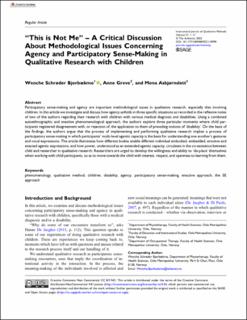| dc.contributor.author | Bjorbækmo, Wenche | |
| dc.contributor.author | Asbjørnslett, Mona | |
| dc.contributor.author | Greve, Anne | |
| dc.coverage.spatial | Norway | en_US |
| dc.date.accessioned | 2022-09-26T11:50:57Z | |
| dc.date.available | 2022-09-26T11:50:57Z | |
| dc.date.created | 2022-08-16T16:08:55Z | |
| dc.date.issued | 2022-08-18 | |
| dc.identifier.issn | 1609-4069 | |
| dc.identifier.uri | https://hdl.handle.net/11250/3021307 | |
| dc.description.abstract | Participatory sense-making and agency are important methodological issues in qualitative research, especially that involving children. In this article we investigate and discuss how agency unfolds in three specific situations as recorded in the reflexive notes of two of the authors regarding their research with children with various medical diagnosis and disabilities. Using a combined autoethnographic and enactive phenomenological approach, the authors explore three particular moments where child participants registered disagreement with, or rejection of, the application to them of prevailing notions of ‘disability’. On the basis of the findings, the authors argue that the process of implementing and performing qualitative research implies a process of participatory sense-making in which participants’ multi-level agentic capacity is the basis for understanding one another’s gestures and vocal expressions. The article illuminates how different bodies enable different individual embodied, embedded, emotive and enacted agentic expressions, and how power, understood as an extended agentic capacity, circulates in the co-existence between child and researcher in qualitative research. Researchers are urged to develop the willingness and ability to ‘dis-place’ themselves when working with child participants, so as to move towards the child with interest, respect, and openness to learning from them. | en_US |
| dc.description.sponsorship | Study 2 received funding from the Fund for Post-Graduate Training in Physiotherapy and Institute of Health and Society, University of Oslo, the authorship and publication of this article got financial support from the Faculty of Health Sciences, Oslo Meteropolitan University. | en_US |
| dc.language.iso | eng | en_US |
| dc.publisher | SAGE Publications | en_US |
| dc.relation.ispartofseries | International Journal of Qualitative Methods (IJQM);Volume 21: 1–11 | |
| dc.rights | Navngivelse-Ikkekommersiell 4.0 Internasjonal | * |
| dc.rights.uri | http://creativecommons.org/licenses/by-nc/4.0/deed.no | * |
| dc.subject | Phenomenology | en_US |
| dc.subject | Qualitative method | en_US |
| dc.subject | Children | en_US |
| dc.subject | Disabilities | en_US |
| dc.subject | Agencies | en_US |
| dc.subject | Participatory sense-making | en_US |
| dc.subject | Enactive approaches | en_US |
| dc.title | “This is not me” – A critical discussion about methodological issues concerning agency and participatory sense-making in qualitative research with children | en_US |
| dc.type | Peer reviewed | en_US |
| dc.type | Journal article | en_US |
| dc.description.version | publishedVersion | en_US |
| dc.rights.holder | © The Author(s) 2022 | en_US |
| cristin.ispublished | true | |
| cristin.fulltext | original | |
| cristin.qualitycode | 1 | |
| dc.identifier.doi | https://doi.org/10.1177/16094069221118990 | |
| dc.identifier.cristin | 2043551 | |
| dc.source.journal | International Journal of Qualitative Methods (IJQM) | en_US |
| dc.source.volume | 21 | en_US |
| dc.source.issue | 21 | en_US |
| dc.source.pagenumber | 1-11 | en_US |

